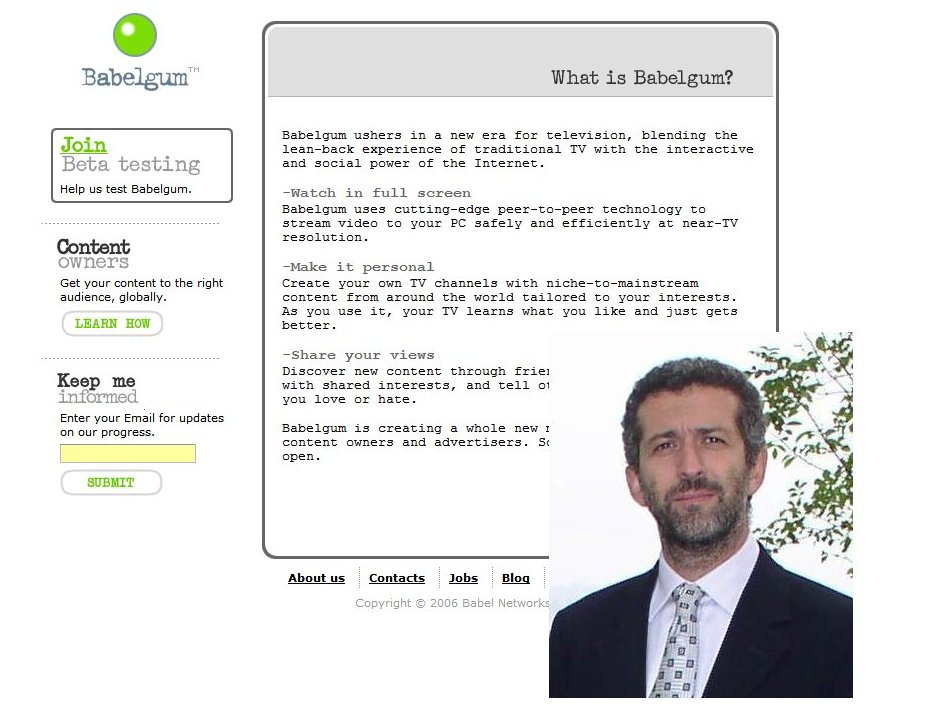Tech.co.uk interview: Babelgum's Erik Lumer
Lumer gives us his observations on internet TV

Babelgum' s CEO Erik Lumer is one of the foremost authorities in internet TV. Babelgum says its service is at the heart of a revolution in video entertainment and education. "It combines the simplicity, immediacy and visual quality of traditional TV with the interactivity, unlimited capacity and global reach of the internet."
Unlike other internet TV services which plan to procure content just from big hitters, Babelgum is designed to offer its users free access to professionally produced content from content owners both large and small. The company wants to deliver niche and independent content that "rarely receives an audience because of the capacity constraints of traditional broadcasting".
Tech.co.uk: Do you think the time is right for internet TV?
Erik Lumer: In a word, yes. Over the past few years broadband internet connectivity has become the norm and video encoding technology has become much more sophisticated and efficient. Those two developments, coupled with the emergence of peer to peer technologies, have enabled us to deliver an immersive and highly interactive user experience that combines the best of broadcast television with the best of television.
The personal computer is fast becoming the centre of home entertainment and it clearly makes sense to deliver broadcast quality video to that platform. We expect this trend to continue as the worlds of television and the internet converge and consumers look to their computers for more and more content. Increasingly consumers are viewing television as a linear experience, necessarily limited by geography and not available to all.
Tech.co.uk: Apart from yourselves, who else do you think are the key players?
EL: There are a number of players in the market - from established broadcasters to aggregators, distributors and content owners. All have a part to play in what is now a developing market. Our view is that there is a place for a variety of models, from 'pay to play' to advertising funded and in certain cases, 'free to air'. Our concentration at the moment is on developing the relationship with content owners so that we can deliver a wide range of content to our users.
Get daily insight, inspiration and deals in your inbox
Sign up for breaking news, reviews, opinion, top tech deals, and more.
Peer 2 Peer (P2P) technology underpins the creation of the internet platform - without P2P we would only be able to replicate the quality of sites like You Tube and use just half or a corner of a screen. Whereas by using P2P technology we are already able to offer full screen, high quality audio and visual.
Tech.co.uk: Is bandwidth still as big an issue for online broadcasters?
EL: There is clearly a requirement for bandwidth, however the core technologies in use are highly efficient and likely to become more so. In addition broadband capacities around the world are increasing every year. Up to 8MB in the UK is likely to be the norm very soon and Babelgum currently requires users to have access to 500KB.
Tech.co.uk: Quality and quantity of content is an obvious problem for online TV. How much of an issue do you think this is currently and will continue to be?
EL: It is absolutely key. There is a place for low quality content, both in terms of production values and resolution etc. However our focus is on delivering a truly immersive viewing experience and for that we need to deliver high quality content in broadcast quality. In particular, it is vital to not simply replicate broadcast television - the existing industry does a very good job of delivering mainstream content - but to deliver content that isn't available by that means. It is that content that will attract viewers and advertisers. Our focus is on bringing exactly that content to the user.
Tech.co.uk: Do you think traditional broadcasters are doing enough to embrace internet TV?
EL: To some extent they are. 'Catch up' services already exist and others are scheduled to launch. But the existing platforms for mainstream content do an excellent job of delivering that mainstream content. It will be some time before traditional broadcasters change their focus from those platforms.
Tech.co.uk: How well do you think consumers are taking to broadband TV and do you think they are excited by it?
EL: It's early days but we have already seen the emergence of viable business models based of the sharing of low quality content. Those services are a good indication of the pent up demand for broadcast quality content delivered via broadband.
You can read more about internet TV in part one and part two of our recent feature: Internet TV: Why the time is now.
Dan (Twitter, Google+) is TechRadar's Former Deputy Editor and is now in charge at our sister site T3.com. Covering all things computing, internet and mobile he's a seasoned regular at major tech shows such as CES, IFA and Mobile World Congress. Dan has also been a tech expert for many outlets including BBC Radio 4, 5Live and the World Service, The Sun and ITV News.